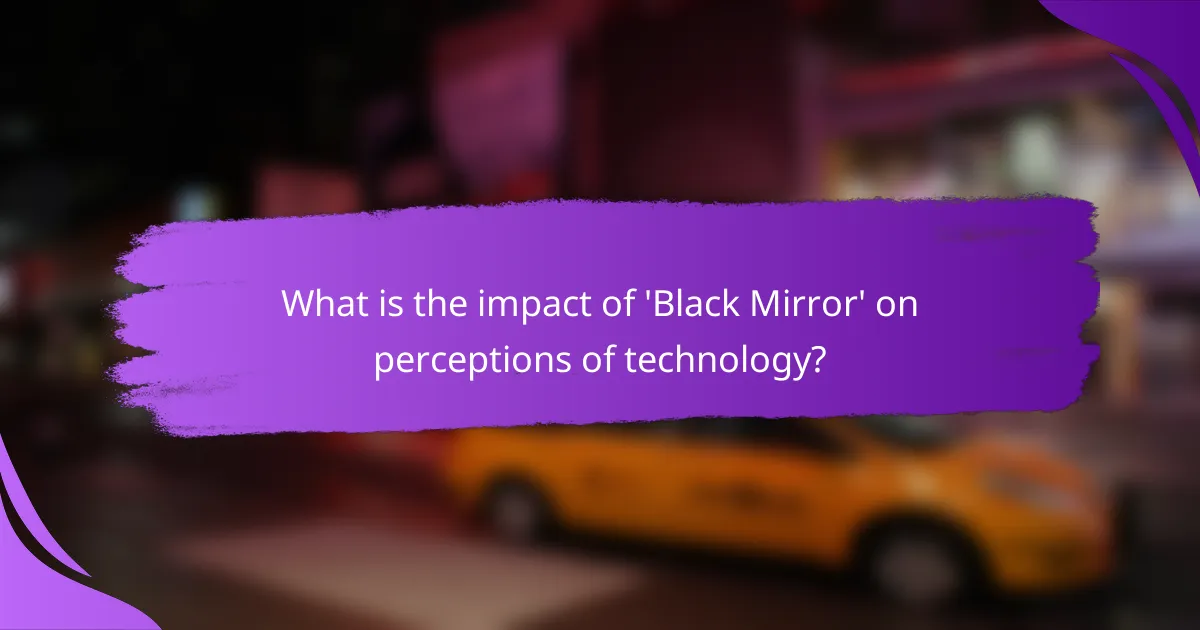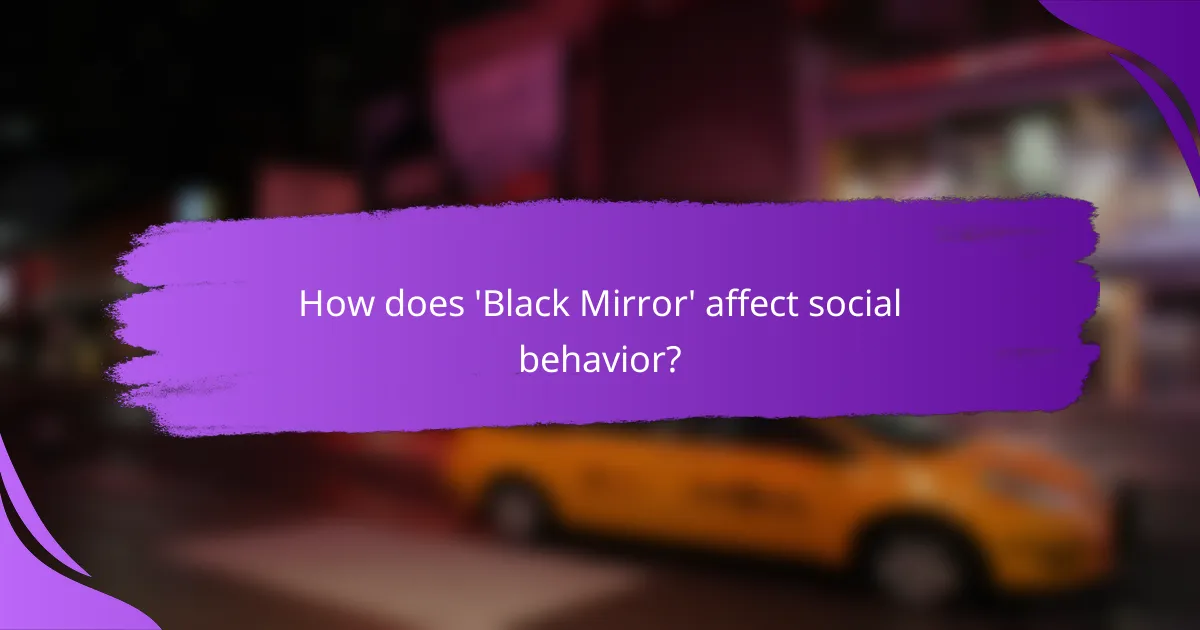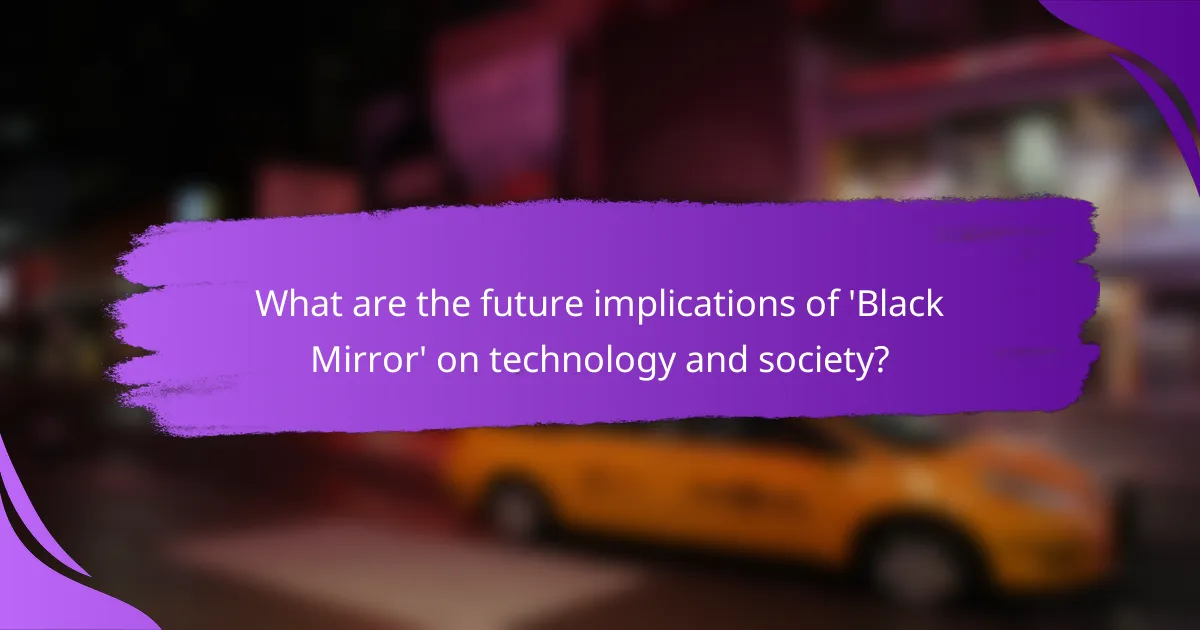‘Black Mirror’ is a television series that explores the impact of advanced technology on society, focusing on its potential risks and ethical dilemmas. The series presents dystopian scenarios that provoke critical discussions about technology’s role in human relationships and societal issues. Research indicates that viewers often reflect on their own technology usage after watching the series, leading to increased awareness of privacy and ethical concerns. The show serves as a catalyst for conversations about responsible technology use and its implications for the future, including the need for regulations to protect individual rights and address mental health effects associated with technology. Ultimately, ‘Black Mirror’ shapes public perception and attitudes toward technological advancements, encouraging proactive engagement with emerging technologies.

What is the impact of ‘Black Mirror’ on perceptions of technology?
‘Black Mirror’ significantly influences perceptions of technology by showcasing its potential risks and ethical dilemmas. The series highlights how technology can amplify human flaws and societal issues. Episodes often depict dystopian futures driven by advanced technology. This portrayal leads audiences to question the implications of current technological trends. Research indicates that viewers often reflect on their own tech usage after watching the series. A survey by The Guardian found that 64% of respondents felt more cautious about technology after viewing ‘Black Mirror’. The show acts as a cautionary tale, prompting discussions about privacy, surveillance, and the human experience. Ultimately, it shapes a critical lens through which society views technological advancements.
How does ‘Black Mirror’ portray technological advancements?
‘Black Mirror’ portrays technological advancements as double-edged swords that can enhance or destroy human experiences. Each episode explores a specific technology’s impact on society. For instance, “Nosedive” critiques social media’s influence on personal relationships and self-worth. “San Junipero” presents virtual reality as a means to achieve eternal life and happiness. The series often highlights ethical dilemmas surrounding technology, such as privacy violations and emotional manipulation. These narratives reflect real-world concerns about emerging technologies. ‘Black Mirror’ serves as a cautionary tale, urging viewers to consider the consequences of unchecked technological growth.
What themes related to technology are prevalent in ‘Black Mirror’?
‘Black Mirror’ explores several prevalent themes related to technology. These themes include the dangers of social media, the impact of virtual reality, and the consequences of surveillance. The series often highlights how technology can lead to isolation and disconnection among individuals. It also examines the ethical dilemmas surrounding artificial intelligence and data privacy. Additionally, ‘Black Mirror’ critiques consumerism and the commodification of human experiences. Each episode serves as a cautionary tale about potential future scenarios shaped by technological advancements. These themes resonate with current societal concerns about technology’s role in everyday life.
How do these portrayals influence public perception of technology?
Portrayals in ‘Black Mirror’ significantly influence public perception of technology. The series often depicts technology’s darker implications. This leads viewers to question the ethical boundaries of technological advancements. For instance, episodes like “Nosedive” highlight social media’s impact on human relationships. This portrayal may foster skepticism towards social media platforms. Additionally, the show illustrates potential dystopian futures resulting from unchecked technological growth. Such narratives can create fear about emerging technologies. Research indicates that media representations shape audience attitudes towards technology (Nielsen, 2018). These influences can drive public discourse on technology regulation and ethical considerations.
In what ways does ‘Black Mirror’ reflect societal views on technology?
‘Black Mirror’ reflects societal views on technology by exploring the dark consequences of technological advancements. The series presents dystopian scenarios that highlight the potential dangers of social media, surveillance, and artificial intelligence. Each episode serves as a cautionary tale, illustrating how technology can exacerbate human flaws. For instance, the episode “Nosedive” critiques social media’s impact on self-worth and societal interactions. Similarly, “Fifteen Million Merits” addresses the commodification of personal experiences. The show prompts viewers to question the ethical implications of their technological reliance. By presenting these narratives, ‘Black Mirror’ encourages critical reflection on current and future technological trends. The show’s popularity and discussions it generates indicate a widespread concern about technology’s role in society.
What societal issues are highlighted through the lens of technology in ‘Black Mirror’?
‘Black Mirror’ highlights various societal issues through its portrayal of technology. It explores themes of privacy invasion, as seen in episodes like “Nosedive,” where social media ratings dictate personal worth. The series also addresses the consequences of surveillance, illustrated in “Fifteen Million Merits,” where individuals are constantly monitored. Mental health impacts are prominent, particularly in “San Junipero,” which questions the ethics of digital afterlives. Additionally, the show critiques consumerism and addiction to technology, exemplified in “USS Callister,” where virtual reality blurs the lines of morality. Through these narratives, ‘Black Mirror’ prompts reflection on the ethical implications of technological advancements.
How do viewers relate to the technological scenarios depicted in the series?
Viewers relate to the technological scenarios depicted in the series by reflecting on their own experiences with technology. The series presents exaggerated versions of current technological trends. This prompts audiences to consider the ethical implications of their own tech usage. Many viewers recognize parallels between the show’s scenarios and real-life technological advancements. For instance, social media dynamics in episodes mirror real-world behaviors. Studies indicate that viewers often express concern about privacy and surveillance, similar to the series’ themes. The emotional responses elicited by the show often lead to discussions about societal impacts. This connection fosters a deeper understanding of technology’s role in everyday life.

How does ‘Black Mirror’ affect social behavior?
‘Black Mirror’ affects social behavior by provoking critical discussions about technology’s role in society. The series presents dystopian scenarios that highlight potential consequences of technological advancements. Viewers often reflect on their own technology usage after watching episodes. This reflection can lead to increased awareness of privacy and ethical concerns. Research indicates that media portrayals can shape public perception and attitudes. A study by the Pew Research Center found that narratives about technology influence societal views on its implications. Consequently, ‘Black Mirror’ serves as a catalyst for conversations about responsible technology use and its impact on human relationships.
What social behaviors are examined in ‘Black Mirror’ episodes?
‘Black Mirror’ episodes examine various social behaviors, including the impact of technology on human relationships. The series highlights issues such as social isolation, addiction to digital devices, and the consequences of virtual reality. It also explores themes of surveillance, privacy, and the commodification of personal experiences. Episodes depict the deterioration of empathy and genuine connections due to technological advancements. The portrayal of social media’s influence on self-worth and public perception is another significant focus. Overall, ‘Black Mirror’ serves as a cautionary tale about the potential negative effects of technology on society and interpersonal dynamics.
How do the characters’ interactions with technology shape their social behavior?
Characters’ interactions with technology significantly shape their social behavior in “Black Mirror.” These interactions often lead to increased isolation and superficial relationships. For example, characters frequently rely on technology for communication instead of face-to-face interactions. This reliance can diminish empathy and emotional connections among individuals. In episodes like “Nosedive,” social media ratings dictate personal interactions, showcasing how technology influences societal values. Furthermore, characters often exhibit anxiety and paranoia due to constant connectivity, impacting their mental health and social dynamics. The portrayal of technology in “Black Mirror” serves as a cautionary tale about its effects on human behavior and relationships.
What lessons about social behavior can be drawn from ‘Black Mirror’?
‘Black Mirror’ illustrates the complexities of social behavior in a technology-driven world. The series highlights the consequences of social media on personal relationships. It shows how digital interactions can lead to isolation and disconnection. Episodes like “Nosedive” depict the impact of social ratings on self-worth and behavior. The show also explores the dangers of surveillance and privacy erosion. It raises questions about authenticity in online personas versus real-life identities. Moreover, ‘Black Mirror’ emphasizes the potential for technology to manipulate emotions and behaviors. This reflection prompts viewers to reconsider their relationship with technology and its societal implications.
How does ‘Black Mirror’ challenge viewers’ social norms?
‘Black Mirror’ challenges viewers’ social norms by presenting dystopian scenarios that reflect contemporary societal issues. Each episode explores the consequences of technological advancements on human behavior and relationships. For example, the episode “Nosedive” critiques social media’s impact on personal worth and societal acceptance. It illustrates how societal validation can dictate individual actions and mental health. Similarly, “Fifteen Million Merits” highlights the commodification of talent and the superficial nature of entertainment culture. This episode underscores the pressure to conform to societal expectations for success. By portraying these extreme realities, ‘Black Mirror’ encourages viewers to question their own values and behaviors in relation to technology. The series serves as a mirror, reflecting potential future consequences of current social trends.
What specific episodes highlight the disruption of social norms?
The specific episodes of ‘Black Mirror’ that highlight the disruption of social norms include “Nosedive,” “Fifteen Million Merits,” and “White Christmas.” In “Nosedive,” social media ratings dictate personal interactions and societal status. The episode illustrates how societal pressure can distort genuine relationships. “Fifteen Million Merits” showcases a dystopian world where individuals earn merits through performance, critiquing consumerism and the commodification of identity. “White Christmas” explores themes of isolation and punishment through technology, challenging moral boundaries. Each episode serves as a critique of contemporary social behaviors and norms, reflecting potential future implications of technology on society.
How do these challenges provoke discussions about current social issues?
The challenges presented in ‘Black Mirror’ provoke discussions about current social issues by highlighting the ethical dilemmas of technology. Each episode presents scenarios that reflect real-world implications of technological advancements. For instance, issues like privacy invasion and social media manipulation are central themes. These narratives encourage viewers to critically examine their own interactions with technology. They prompt conversations about the consequences of unchecked technological growth. Furthermore, the series often mirrors contemporary societal anxieties, making the discussions more relatable. By engaging with these challenges, audiences confront uncomfortable truths about their own lives. This reflection can lead to a greater awareness of the need for ethical considerations in technology development.

What are the future implications of ‘Black Mirror’ on technology and society?
‘Black Mirror’ serves as a cautionary reflection on technology’s potential impacts on society. The series explores scenarios that highlight ethical dilemmas and societal consequences of technological advancements. It prompts viewers to critically evaluate their relationship with technology. Future implications include increased public awareness of privacy issues and mental health effects tied to technology use. As technology evolves, society may push for regulations to protect individual rights. This could lead to enhanced discussions on the ethical use of AI and data. The series has already influenced debates on social media’s role in shaping public perception. Its narratives encourage proactive engagement with emerging technologies to mitigate negative outcomes.
How does ‘Black Mirror’ predict future technological trends?
‘Black Mirror’ predicts future technological trends by exploring the dark implications of emerging technologies. Each episode examines societal issues linked to advancements like virtual reality, artificial intelligence, and social media. The series often portrays scenarios that reflect real-world technological anxieties. For instance, the episode “Nosedive” critiques social media’s influence on personal worth and societal interactions. Similarly, “San Junipero” explores the concept of consciousness transfer and digital immortality. These narratives serve as cautionary tales about the potential consequences of unchecked technological growth. By presenting exaggerated yet plausible futures, ‘Black Mirror’ encourages viewers to reflect on current technological trajectories. This reflection can influence public discourse on technology’s role in society.
What technologies depicted in ‘Black Mirror’ are becoming reality?
Technologies depicted in ‘Black Mirror’ that are becoming reality include virtual reality, social credit systems, and advanced surveillance. Virtual reality has seen significant advancements with devices like Oculus Rift and HTC Vive. These technologies allow immersive experiences similar to those shown in episodes like “USS Callister.” Social credit systems, as seen in “Nosedive,” are being implemented in countries like China, where citizens are rated based on behavior. Surveillance technologies, such as [censured] recognition, are increasingly used by law enforcement, echoing themes from episodes like “White Christmas.” These developments reflect a trend toward the integration of such technologies into everyday life.
How do these predictions shape our understanding of future societal changes?
Predictions in “Black Mirror” shape our understanding of future societal changes by highlighting potential consequences of technology. The series presents scenarios where technology exacerbates social issues. It illustrates how reliance on technology can lead to isolation and diminished human interaction. Each episode serves as a cautionary tale, prompting viewers to reflect on current technological trends. For instance, the episode “Nosedive” critiques social media’s impact on personal relationships and self-worth. Such narratives encourage discussions on ethical technology use. They also stimulate awareness of privacy concerns and mental health implications. Overall, these predictions challenge society to consider the trajectory of technological advancement and its societal effects.
What ethical dilemmas does ‘Black Mirror’ raise about future technology?
‘Black Mirror’ raises several ethical dilemmas about future technology. It explores the implications of surveillance and privacy. In episodes like “Nosedive,” social credit systems affect personal relationships and self-worth. The series also questions the morality of artificial intelligence, as seen in “White Christmas.” Here, AI consciousness blurs the line between human and machine. Furthermore, it examines the consequences of technology addiction, highlighting social isolation. The portrayal of virtual reality in “San Junipero” raises issues of consent and identity. Overall, ‘Black Mirror’ serves as a cautionary tale about unchecked technological advancement.
Which ethical issues are most frequently explored in the series?
The series ‘Black Mirror’ frequently explores ethical issues such as privacy, surveillance, and technology’s impact on human relationships. These themes illustrate the consequences of advanced technology on personal autonomy and societal norms. For example, episodes like “Nosedive” critique social media’s influence on self-worth and interpersonal connections. “Fifteen Million Merits” highlights the ethical dilemmas of commodifying human experiences and the consequences of a performance-driven society. The series raises questions about the morality of artificial intelligence and its implications for humanity, particularly in episodes like “White Christmas.” These narratives provoke viewers to reflect on their relationship with technology and the ethical ramifications of its pervasive presence in daily life.
How can these ethical dilemmas inform current technology development?
Ethical dilemmas can guide current technology development by highlighting potential risks and societal impacts. They encourage developers to consider the moral implications of their innovations. For instance, dilemmas surrounding data privacy inform how companies handle user information. Such considerations lead to stronger data protection laws and ethical guidelines. Additionally, issues of algorithmic bias push for more inclusive design practices. This results in technology that serves diverse populations fairly. Historical examples, like the backlash against social media platforms for misinformation, demonstrate the need for accountability. Therefore, integrating ethical considerations into technology development can foster responsible innovation.
What practical insights can we gain from ‘Black Mirror’ regarding technology and social behavior?
‘Black Mirror’ provides insights into the potential consequences of technology on social behavior. The series explores themes such as surveillance, social media addiction, and the impact of virtual reality. Each episode serves as a cautionary tale about the dark side of innovation. For example, “Nosedive” illustrates how social media ratings can dictate personal worth. “Fifteen Million Merits” critiques consumerism and the dehumanization of individuals. These narratives highlight the risks of losing genuine human connections. They also emphasize the importance of ethical considerations in technological advancements. Ultimately, ‘Black Mirror’ encourages viewers to reflect on their relationship with technology and its societal implications.
The main entity of this article is ‘Black Mirror,’ a television series that explores the impact of technology on society and social behavior. The article examines how ‘Black Mirror’ influences public perceptions of technology by highlighting its risks and ethical dilemmas, prompting viewers to reflect on their own tech usage. Key themes include the portrayal of social media, surveillance, and the commodification of human experiences, which challenge societal norms and provoke discussions about current social issues. Additionally, the article addresses the future implications of the series on technology development and ethical considerations, providing practical insights into the relationship between technology and social behavior.